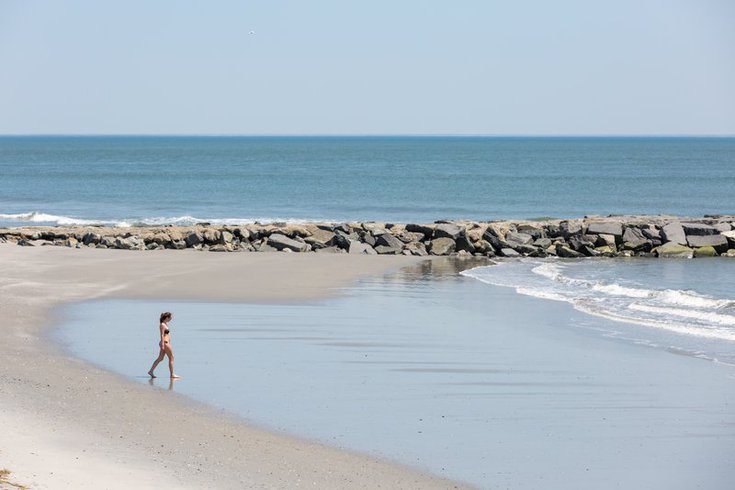
July 06, 2023
 Thom Carroll/PhillyVoice
Thom Carroll/PhillyVoice
Fourteen percent of New Jersey beaches, including several in Atlantic City, experienced at least one day when fecal contamination levels reached potentially unsafe levels last year, a new report finds. Above, a file photo of a beach in Atlantic City.
There's nothing like cooling off in the ocean during a hot day down the shore, but according to new research there may be some invisible dangers lurking off the coast.
In 2022, more than half of U.S. beaches experienced at least one day when fecal contamination levels reached potentially unsafe levels, according to a report published this week by Environment America, a Boston-based research and advocacy group. Fecal contamination can cause gastrointestinal illnesses and other health issues.
The report examined water quality data from 3,192 beaches, including 217 in New Jersey. It found that 55% of beaches nationwide, and 14% of those in New Jersey, had fecal contamination levels that exceeded the standard that the U.S. Environmental Protection Agency uses to issue advisories or close beaches.
The Atlantic City beaches at Mississippi and Texas avenues had the most potentially unsafe days among Jersey Shore beaches. They each exceeded the EPA standard on 3 of 22 testing days last year. The average Atlantic County beach potentially was unsafe for swimming on 2% of days that testing took place, the highest percentage in the state.
Here are the New Jersey beaches where contamination levels exceeded safe levels on at least two days last year:
| Beach | Municipality | Unsafe Days |
| Mississippi Avenue | Atlantic City | 3 |
| Texas Avenue | Atlantic City | 3 |
| Brooklyn Avenue | Lavallette | 2 |
| North Carolina Avenue | Atlantic City | 2 |
| 10th Street | Barnegat Light | 2 |
| Shelter Cove | Tom's River | 2 |
Every year, an estimated 57 million cases of illness nationwide are caused by swimming in oceans or other bodies of water, although many cases go unreported.
People who swim in contaminated water can contract gastrointestinal illnesses, which are caused by swallowing pathogen-polluted water and can lead to symptoms like diarrhea, nausea, vomiting, stomach cramps, fever and aches. Contaminated water also can lead to ear and eye infections, respiratory diseases and skin rashes, according to Environment America.
The contamination can originate from various sources, including stormwater runoff, sewage overflows, manure from industrial livestock production and the development of roads, parking lots and large homes.
Though the report may be alarming, experts don't necessarily urge beachgoers to throw in the towel when it comes to enjoying the ocean.
"I think the cold, hard truth is you can pick up a bad actor — germs, species or bacteria — on any given day from a host of sources, one of which is the body of water you're wading in," Keith Lambert, a pollution control veteran, told FOX News. "Simple things like washing your hands after a hike or showering well with soap and water after a swim are the practical actions to take."
At the Jersey Shore, beachgoers can keep an eye on beach advisories and closures posted by the New Jersey Department of Environmental Protection to find out if there are any health warnings on a given day. Contaminated water led to more than 8,700 warnings or closures last year, the Environment America report said.
Follow Franki & PhillyVoice on Twitter: @wordsbyfranki
| @thePhillyVoice
Like us on Facebook: PhillyVoice
Have a news tip? Let us know.